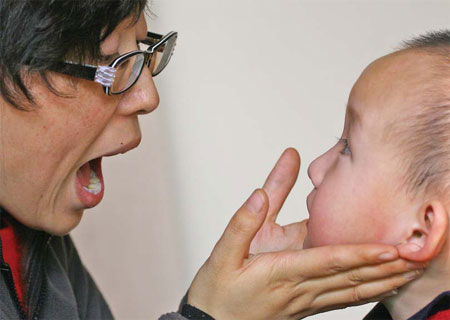IN BRIEF (Page 2)

| Wang Ming, a teacher in a rehabilitation center in Lanzhou, Gansu province, instructs an autistic 3-year-old. Wang has to repeat a word as many as 1,000 times before the child can pronounce it. Cao Zhizheng / for China Daily |
Health
Autism groups lack staff, funding
The country's fledgling autism organizations are short of professional staff and government support, a recent survey shows.
More than half of the autism organizations, or rehabilitation centers, covered in the survey in South China were founded by parents of autistic children, and they raised 75 percent of their initial funding on their own, according to the Shenzhen Autism Society and One Foundation charity, which co-organized the survey.
The families of autism sufferers pay about 91 percent of the operating costs of these groups, the report said. The report is part of a larger national report to be released on April 2, which is also World Autism Awareness Day.
Food
War declared on illegal additives
Tough penalties will be used to end entrenched abuses in the catering industry, such as the use of poppy capsules, a major source of many opiates, and industrial coloring agents, according to the top food administrator.
The State Food and Drug Administration will urge in its 2012 food regulation plan a crackdown on the illegal use of additives.
Hotpot broth, beverages and seasonings will be key targets, as they are "danger zones" for food safety incidents triggered by additives. Although some restaurant chains vouch for their food quality, some hotpot stores are still using poppy capsules, which can even lead to addiction, insiders said.
Society
Call for quality, not quantity
The urbanization in China has rocketed over the past three decades, but statistics don't tell the whole story, and the country faces a challenge in improving the quality of urbanization, senior officials said.
Urban residents accounted for 51.27 percent of the population in 2011, compared with about 18 percent in 1978 at the beginning of reform and opening-up, according to official figures.
However, this rapid pace of growth is unsustainable, as it is, to some extent, based on cheap labor and land, insufficient social security and inadequate public services. China must improve the quality of its urbanization, said Peng Sen, deputy minister of the National Development and Reform Commission, at the China International Urbanization Forum in Shanghai.
Transport
Residents urged to share taxis
Beijing traffic authorities are encouraging residents to share taxis to overcome the shortage of cabs during rush hours. "Regulations permit co-hiring a taxi when all passengers get in the car at the same place and head in the same direction," Yao Kuo, director of the Beijing transportation law enforcement team, said. "We hope taxi enterprises will try to offer such a service," he said.
Yao warned that taxi drivers who refused to accept shared hiring would be penalized. The city's traffic and finance authorities already have rules that stipulate a passenger pays 60 percent of the cost of a trip that is jointly taken.
China Daily

(China Daily 03/30/2012 page2)
Today's Top News
- Xi calls for promoting volunteer spirit to serve national rejuvenation
- Xi chairs CPC meeting to review report on central discipline inspection
- Reunification will only make Taiwan better
- Outline of Xi's thought on strengthening military published
- Targeted action plan to unleash consumption momentum
- Separatist plans of Lai slammed































